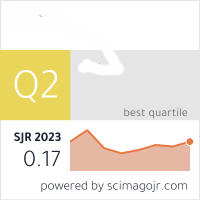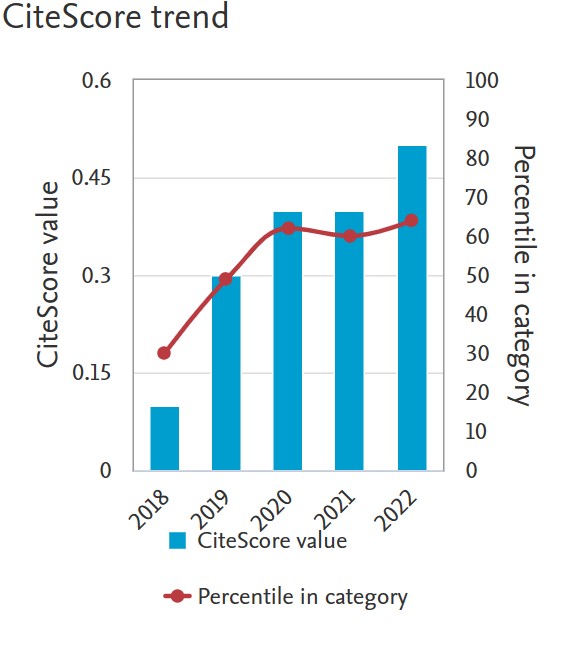Knowledge, Attitude and Practice toward COVID 19 Preventive Measures: A cross-sectional study in Duhok Governorat
Keywords:
Knowledge, Attitude, Practice, COVID-19, PreventionAbstract
Background: Evaluation of Coronavirus illness prevention efforts in the public health field relies heavily on three factors: knowledge, attitude, and practice. According to the World Health Organization (WHO), new viral diseases pose a significant risk to global health. The purpose of this study was to find the relationship between socio-demographic factors and the use of prevention measures against COVID-19 by assessing the knowledge, attitude, and practice (KAP) of residents of Duhok governorate in Iraqi Kurdistan. Methods: A cross-sectional study was conducted in the general population of Duhok Governorate, between the ages of 18 and 75, using a multi-stage cluster sampling technique. A structured questionnaire was employed, and it included a KAP questions about potential preventive measures for COVID-19 (vaccines, face masks, social distances and hygiene). Additionally, the demographics were evaluated. Results: One thousand people took part in the study, and 77.5 % of them were able to correctly identify the best preventative steps to take against the spread of the COVID-19 virus (Excellent). However, only 56.9% of the public had a positive attitude on and 66.1% of the population really took preventive actions against COVID-19 (Moderate). Our results showed that sex, marital status and economic status in the knowledge test were no significant correlation at (P<0.01). In contrast, there was statistically significant variation across all other demographic factors (age, occupation, religion, education, and place of residence) at (P<0.01). However, only religion showed a significant correlation at (P<0.01) on the attitude test, but both sex and location matched on the practice test. Other demographic factors, such as age, occupation, and education level, were significant at (P<0.01). Conclusion: According to the results, almost three quarter of the population in the Duhok Governorate has outstanding knowledge in relation to socio-demographic factors, and more than half have a reasonable attitude and practice regarding COVID-19 preventive measures.
Downloads
References
Team TNCPERE. The Epidemiological
Characteristics of an Outbreak of 2019 Novel
Coronavirus Diseases (COVID-19) — China,
China CDC Wkly [Internet]. 2020 Feb 2
[cited 2022 Sep 5];2(8):113. Available from:
/pmc/articles/PMC8392929/
Zhong BL, Luo W, Li HM, Zhang QQ, Liu XG,
Li WT, et al. Knowledge, attitudes, and practices
towards COVID-19 among chinese residents
during the rapid rise period of the COVID-19
outbreak: A quick online cross-sectional survey.
Int J Biol Sci. 2020;16(10):1745–52.
Li H, Liu SM, Yu XH, Tang SL, Tang CK.
Coronavirus disease 2019 (COVID-19): current
status and future perspectives. Int J Antimicrob
Agents. 2020 May 1;55(5):105951.
Worldometers. worldometers.info/coronavirus. 1.
COVID-19: Situation Update - GOV.KRD
[Internet]. [cited 2022 Sep 5]. Available from:
https://gov.krd/coronavirus-en/situation-update/
Aziz PY, Hadi JM, Sha AM, Aziz SB, Rahman HS,
Ahmed HA, et al. The strategy for controlling
COVID-19 in Kurdistan Regional Government
(KRG)/Iraq: Identification, epidemiology,
transmission, treatment, and recovery. International
Journal of Surgery Open. 2020 Jan 1;25:41–6.
Case Definitions for Infectious Conditions
Under Public Health Surveillance [Internet].
[cited 2022 Sep 5]. Available from:
https://wonder.cdc.gov/wonder/Prevguid/m0
/m0047449.asp.
Team TNCPERE. The Epidemiological
Characteristics of an Outbreak of 2019 Novel
Coronavirus Diseases (COVID-19) — China,
China CDC Wkly [Internet]. 2020 Feb
[cited 2022 Sep 5];2(8):113. Available from:
/pmc/articles/PMC8392929/.
Gomes C. Report of the WHO-China Joint
Mission on Coronavirus Disease 2019 (COVID-
. Brazilian Journal of Implantology and
Health Sciences [Internet]. 2020 Mar 24 [cited
Sep 5];2(3). Available from:
https://bjihs.emnuvens.com.br/bjihs/article/vie
w/172.
Kurdistan Region Statistics Office [Internet].
[cited 2022 Sep 5]. Available from:
Sample Size Calculator by Raosoft, Inc.
[Internet]. [cited 2022 Sep 5]. Available from:
http://www.raosoft.com/samplesize.html.
World Bank. 2018. Iraq Economic Monitor:
Toward Reconstruction, Economic Recovery
and Fostering Social Cohesion.
http://documents.worldbank.org/curated/en/
/Iraq-EconomicMonitor-Toward-Reconstruction EconomicRecovery-and-Fostering-Social-CohesionChristy JS, Kaur K, Gurnani B, Hess OM,
Narendran K, Venugopal A, et al. Knowledge,
attitude and practise toward COVID-19
among patients presenting to five tertiary eye
care hospitals in South India - A multicentre
questionnaire-based survey. Indian J
Ophthalmol [Internet]. 2020 Nov 1 [cited
Sep 5];68(11):2385. Available from:
/pmc/articles/PMC7774232/.
Ferdous MZ, Islam MS, Sikder MT,
Mosaddek ASM, Zegarra-Valdivia JA, Gozal
D. Knowledge, attitude, and practice
regarding COVID-19 outbreak in Bangladesh:
An online-based cross-sectional study. PLoS
One [Internet]. 2020 Oct 1 [cited 2022 Sep
;15(10):e0239254. Available from:
https://journals.plos.org/plosone/article?id=1
1371/journal.pone.0239254.
Saqlain M, Munir MM, Rehman SU, Gulzar
A, Naz S, Ahmed Z, Tahir AH, Mashhood
M. Knowledge, attitude, practice and
perceived barriers among healthcare workers
regarding COVID-19: a cross-sectional survey
from Pakistan. Journal of hospital infection.
Jul 1;105(3):419-23.
Kilic M, Ustundag Ocal N, Uslukilic G. The
relationship of Covid-19 vaccine attitude with
life satisfaction, religious attitude and Covid-
avoidance in Turkey.
https://doi.org/101080/216455152021193849
[Internet]. 2021 [cited 2022 Sep 5];
Available
from:https://www.tandfonline.com/doi/abs/1
1080/21645515.2021.1938493
Firouzbakht M, Omidvar S, Firouzbakht S,
Asadi-Amoli A. COVID-19 preventive
behaviors and influencing factors in the
Iranian population; a web-based survey. BMC
Public Health [Internet]. 2021 Dec 1 [cited
Sep 5];21(1):1–7. Available from:
https://bmcpublichealth. biomedcentral.
com/ articles/10.1186/s12889-021-10201-4.
COVID-19 Vaccine Effectiveness | CDC
[Internet]. [cited 2022 Sep 5]. Available from:
https://www.cdc.gov/coronavirus/2019-
ncov/vaccines/effectiveness/index.html.
Why vaccinated people still get sick with
COVID-19 - The Loop [Internet]. [cited 2022
Sep 5]. Available from:
https://medcom.uiowa.edu/theloop/in-thespotlight/why-vaccinated-people-still-getsick-with-covid-19.
Downloads
Published
Issue
Section
License
You are free to:
- Share — copy and redistribute the material in any medium or format for any purpose, even commercially.
- Adapt — remix, transform, and build upon the material for any purpose, even commercially.
- The licensor cannot revoke these freedoms as long as you follow the license terms.
Under the following terms:
- Attribution — You must give appropriate credit , provide a link to the license, and indicate if changes were made . You may do so in any reasonable manner, but not in any way that suggests the licensor endorses you or your use.
- No additional restrictions — You may not apply legal terms or technological measures that legally restrict others from doing anything the license permits.
Notices:
You do not have to comply with the license for elements of the material in the public domain or where your use is permitted by an applicable exception or limitation .
No warranties are given. The license may not give you all of the permissions necessary for your intended use. For example, other rights such as publicity, privacy, or moral rights may limit how you use the material.











